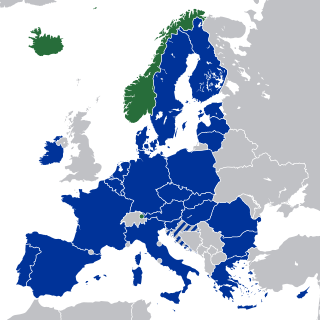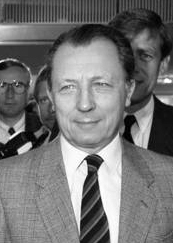
The European Union (EU) is a supranational political and economic union of 27 member states that are located primarily in Europe. The union has a total area of 4,233,255 km2 (1,634,469 sq mi) and an estimated total population of over 448 million. The EU has often been described as a sui generis political entity combining the characteristics of both a federation and a confederation.

The European Economic Community (EEC) was a regional organisation created by the Treaty of Rome of 1957, aiming to foster economic integration among its member states. It was subsequently renamed the European Community (EC) upon becoming integrated into the first pillar of the newly formed European Union in 1993. In the popular language, however, the singular European Community was sometimes inaccurately used in the wider sense of the plural European Communities, in spite of the latter designation covering all the three constituent entities of the first pillar.

The Treaty on European Union, commonly known as the Maastricht Treaty, is the foundation treaty of the European Union (EU). Concluded in 1992 between the then-twelve member states of the European Communities, it announced "a new stage in the process of European integration" chiefly in provisions for a shared European citizenship, for the eventual introduction of a single currency, and for common foreign and security policies. Although these were widely seen to presage a "federal Europe", the focus of constitutional debate shifted to the later 2007 Treaty of Lisbon. In the wake of the Eurozone debt crisis unfolding from 2009, the most enduring reference to the Maastricht Treaty has been to the rules of compliance – the "Maastricht criteria" – for the currency union.

The president of the European Commission is the head of the European Commission, the executive branch of the European Union (EU). The president of the Commission leads a cabinet of Commissioners, referred to as the College. The president is empowered to allocate portfolios among, reshuffle, or dismiss Commissioners as necessary. The College directs the commission's civil service, sets the policy agenda and determines the legislative proposals it produces. The commission is the only body that can propose or draft bills to become EU laws.

The European Union is a geo-political entity covering a large portion of the European continent. It is founded upon numerous treaties and has undergone expansions and secessions that have taken it from six member states to 27, a majority of the states in Europe.

The European Economic Area (EEA) was established via the Agreement on the European Economic Area, an international agreement which enables the extension of the European Union's single market to member states of the European Free Trade Association. The EEA links the EU member states and three EFTA states into an internal market governed by the same basic rules. These rules aim to enable free movement of persons, goods, services, and capital within the European single market, including the freedom to choose residence in any country within this area. The EEA was established on 1 January 1994 upon entry into force of the EEA Agreement. The contracting parties are the EU, its member states, and Iceland, Liechtenstein, and Norway. New members of EFTA would not automatically become party to the EEA Agreement, as each EFTA State decides on its own whether it applies to be party to the EEA Agreement or not. According to Article 128 of the EEA Agreement, “any European State becoming a member of the Community shall, and the Swiss Confederation or any European State becoming a member of EFTA may, apply to become a party to this Agreement. It shall address its application to the EEA Council.” EFTA does not envisage political integration. It does not issue legislation, nor does it establish a customs union. Schengen is not a part of the EEA Agreement. However, all of the four EFTA States participate in Schengen and Dublin through bilateral agreements. They all apply the provisions of the relevant Acquis.

Jacques Lucien Jean Delors is a French retired politician who served as the eighth president of the European Commission from 1985 to 1995. He served as Minister of Finance of France from 1981 to 1984. He was a Member of the European Parliament from 1979 to 1981. As President, Delors was the most visible and influential leader in European affairs. He implemented the policies that closely linked the member nations together and promoted the need for unity. He created a single market that made the free movement of persons, capital, goods, and services within the European Economic Community (EEC) possible. He also headed the so-called Delors Committee which proposed the monetary union to create the Euro, a new single currency to replace individual national currencies. This was achieved by the signing of the Maastricht Treaty in 1992.

The euro area, commonly called the eurozone (EZ), is a currency union of 20 member states of the European Union (EU) that have adopted the euro (€) as their primary currency and sole legal tender, and have thus fully implemented EMU policies.

The European Communities (EC) were three international organizations that were governed by the same set of institutions. These were the European Coal and Steel Community (ECSC), the European Atomic Energy Community, and the European Economic Community (EEC); the last of which was renamed the European Community (EC) in 1993 by the Maastricht Treaty establishing the European Union. The European Union was established at that time more as a concept rather than an entity, while the Communities remained the actual subjects of international law impersonating the rather abstract Union, becoming at the same time its first pillar. In the popular language, however, the singular European Community was sometimes inaccurately used interchangeably with the plural phrase, in the sense of referring to all three entities.

The following outline is provided as an overview of and topical guide to the European Union:

The special territories of members of the European Economic Area (EEA) are the 32 special territories of EU member states and EFTA member states which, for historical, geographical, or political reasons, enjoy special status within or outside the European Union and the European Free Trade Association.

The Single European Act (SEA) was the first major revision of the 1957 Treaty of Rome. The Act set the European Community an objective of establishing a single market by 31 December 1992, and a forerunner of the European Union's Common Foreign and Security Policy (CFSP) it helped codify European Political Co-operation. The amending treaty was signed at Luxembourg City on 17 February 1986 and at The Hague on 28 February 1986. It came into effect on 1 July 1987, under the Delors Commission.

European Union citizenship is afforded to all citizens of member states of the European Union (EU). It was formally created with the adoption of the 1992 Maastricht Treaty, at the same time as the creation of the EU. EU citizenship is additional to, as it does not replace, national citizenship. It affords EU citizens with rights, freedoms and legal protections available under EU law.

The euro came into existence on 1 January 1999, although it had been a goal of the European Union (EU) and its predecessors since the 1960s. After tough negotiations, the Maastricht Treaty entered into force in 1993 with the goal of creating an economic and monetary union (EMU) by 1999 for all EU states except the UK and Denmark.

Between 1973 and 1993 the European Communities saw the first enlargement of the Communities. On 1 January 1973, Denmark, Ireland, and the United Kingdom became the first countries to join the Communities. The détente allowed initiation of the reunification of the continent through establishing the Conference on Security and Co-operation in Europe. Greece was the next to join EC on 1 January 1981, followed by Spain and Portugal joining on 1 January 1986, while Turkey has initiated the procedure in 1987. Upon the fall of the Iron Curtain, the CSCE was transformed in 1990 into Organization for Security and Co-operation in Europe, the Communities enlarged for a fourth time through the German reunification, while other former communist European countries stated their firm commitment to join, prompting formulation of the Copenhagen criteria. This period was, however, also the one which witnessed the first voluntary exit from the Communities, namely the one of Greenland in 1985. The integration progressed under the Delors Commission resulting in the creation of the European Union in 1993.

This is a timeline of European Union history and its previous development.
European Union (EU) concepts, acronyms, and jargon are a terminology set that has developed as a form of shorthand, to quickly express a (formal) EU process, an (informal) institutional working practice, or an EU body, function or decision, and which is commonly understood among EU officials or external people who regularly deal with EU institutions.

The history of the European Union between 1993 and 2004 was the period between its creation and the 2004 enlargement. The European Union was created at the dawn of the post–Cold War era and saw a series of successive treaties laying the ground for the euro, foreign policy and future enlargement. Three new member states joined the previous twelve in this period and the European Economic Area extended the reach of the EU's markets to three more.

The Treaties of the European Union are a set of international treaties between the European Union (EU) member states which sets out the EU's constitutional basis. They establish the various EU institutions together with their remit, procedures and objectives. The EU can only act within the competences granted to it through these treaties and amendment to the treaties requires the agreement and ratification of every single signatory.
Events in the year 1993 in the European Union.


















